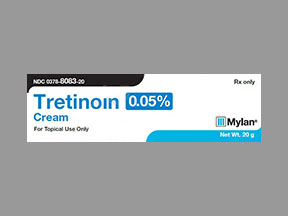My prescription
Edit
20GM of 0.05%, Tretinoin (1 Tube)
Select pharmacy

CVS
$40.06
COUPON PRICE
Albertsons
$25.49
COUPON PRICE
Walgreens
$32.60
COUPON PRICE
Walmart
$37.43
COUPON PRICETretinoin savings card
Show this card to your pharmacist
Albertsons
$25.49
BIN
ID
PCN
GRP
011867
LH39543630
HT
LABH001
Powered by
More prescriptions for leukemia
More prescriptions for leukemia
Price history for Retin-a (brand) & Tretinoin (generic)
1 Tube, 20GM of 0.05%
Average retail price for Retin-a
Average retail price for Tretinoin
Average SaveHealth price for Tretinoin
Our price history data is based on aggregated prescription data collected from participating pharmacies in America. Our prescription data updates daily to reflect the latest price changes. If you notice a missing data point, it means there wasn't sufficient data available to generate a monetary value for that date.
We analyzed Tretinoin prices for (20GM of 0.05%, 1 Tube) over the last 12 months. The average retail price was $140.86, while the average price using the SaveHealth discount card was $60.38. That's a savings of approximately 57.13% when using our Tretinoin coupon.
Compared to the generic version, Retin-a had an average price of $131.07 over the same time period. With the SaveHealth savings card, Tretinoin is 53.93% cheaper on average than Retin-a.
*Retail prices are based on pharmacy claims data, and may not be accurate when we don't have enough claims.
Tretinoin dosage forms
Dosage Quantity Price from Per unit 15GM of 0.01% 1 Tube $34.62 $34.62 15GM of 0.01% 2 Tubes $50.93 $25.46 15GM of 0.01% 3 Tubes $75.25 $25.08 15GM of 0.01% 4 Tubes $91.57 $22.89 15GM of 0.01% 5 Tubes $107.89 $21.58 15GM of 0.025% 1 Tube $39.81 $39.81 15GM of 0.025% 2 Tubes $67.25 $33.63 15GM of 0.025% 3 Tubes $99.73 $33.24 15GM of 0.025% 5 Tubes $148.68 $29.74 15GM of 0.025% 10 Tubes $271.06 $27.11
| Dosage | Quantity | Price from | Per unit |
|---|---|---|---|
| 15GM of 0.01% | 1 Tube | $34.62 | $34.62 |
| 15GM of 0.01% | 2 Tubes | $50.93 | $25.46 |
| 15GM of 0.01% | 3 Tubes | $75.25 | $25.08 |
| 15GM of 0.01% | 4 Tubes | $91.57 | $22.89 |
| 15GM of 0.01% | 5 Tubes | $107.89 | $21.58 |
| 15GM of 0.025% | 1 Tube | $39.81 | $39.81 |
| 15GM of 0.025% | 2 Tubes | $67.25 | $33.63 |
| 15GM of 0.025% | 3 Tubes | $99.73 | $33.24 |
| 15GM of 0.025% | 5 Tubes | $148.68 | $29.74 |
| 15GM of 0.025% | 10 Tubes | $271.06 | $27.11 |
| 20GM of 0.05% | 1 Tube | $32.60 | $32.60 |
| 20GM of 0.1% | 1 Tube | $27.16 | $27.16 |
| 20GM of 0.1% | 2 Tubes | $36.01 | $18.00 |
| 20GM of 0.1% | 3 Tubes | $52.87 | $17.62 |
| 20GM of 0.1% | 4 Tubes | $61.72 | $15.43 |
| 20GM of 0.1% | 6 Tubes | $79.44 | $13.24 |
| 20GM of 0.05% | 2 Tubes | $55.61 | $27.80 |
| 20GM of 0.05% | 3 Tubes | $75.92 | $25.31 |
| 20GM of 0.05% | 4 Tubes | $96.22 | $24.05 |
| 20GM of 0.05% | 5 Tubes | $116.53 | $23.31 |
| 20GM of 0.025% | 1 Tube | $23.82 | $23.82 |
| 20GM of 0.025% | 2 Tubes | $36.01 | $18.00 |
| 20GM of 0.025% | 3 Tubes | $52.87 | $17.62 |
| 20GM of 0.025% | 4 Tubes | $61.72 | $15.43 |
| 20GM of 0.025% | 6 Tubes | $79.44 | $13.24 |
| 45GM of 0.05% | 1 Tube | $68.24 | $68.24 |
| 45GM of 0.05% | 2 Tubes | $128.97 | $64.48 |
| 45GM of 0.05% | 3 Tubes | $189.71 | $63.24 |
| 45GM of 0.05% | 4 Tubes | $250.45 | $62.61 |
| 45GM of 0.05% | 7 Tubes | $432.66 | $61.81 |

